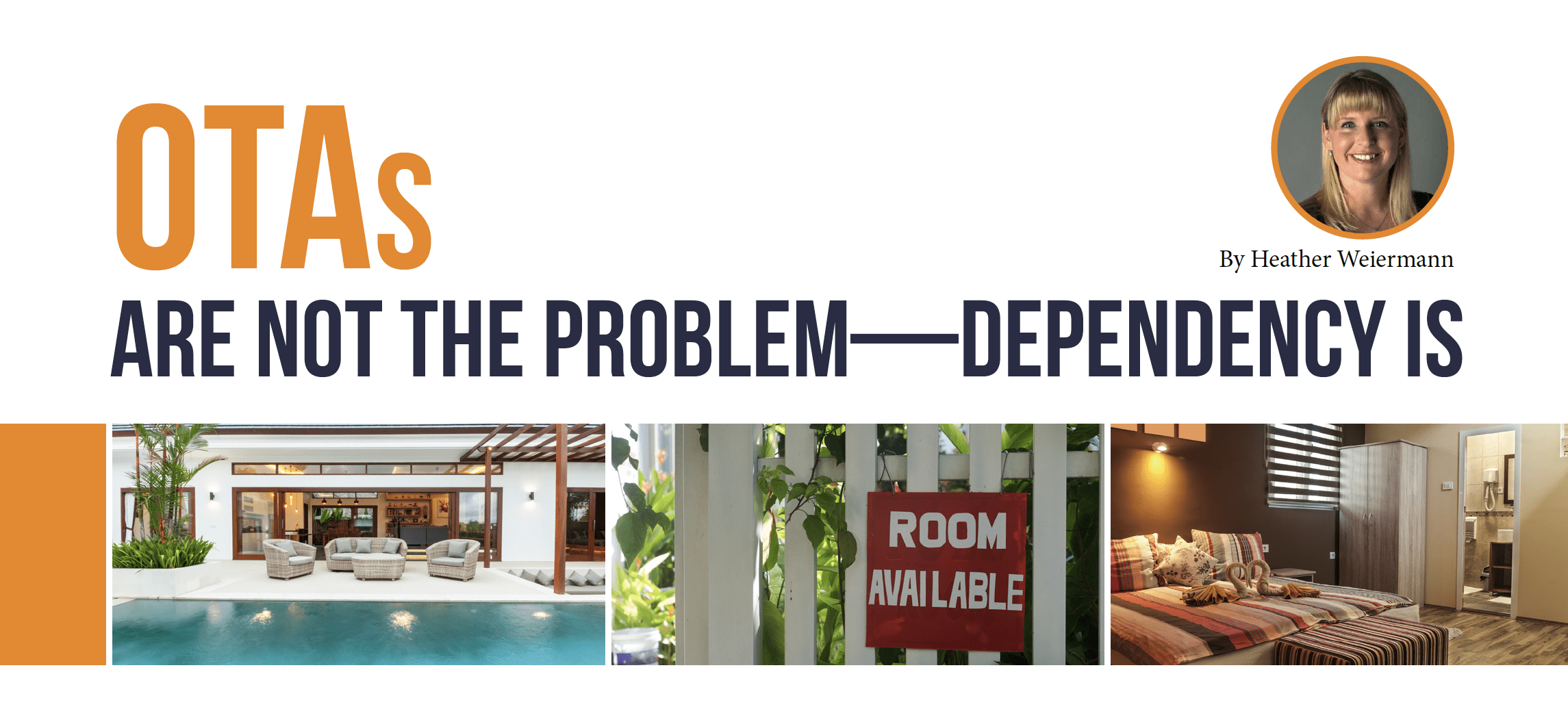One of the more popular sports in the vacation rental industry today seems to be bashing listing sites and OTAs (online travel agencies). The likes of HomeAway, Expedia, Airbnb, and—don’t forget—TripAdvisor are being blamed for commoditizing vacation homes, for diminishing rates, and for training guests to expect deep discounts or refunds. If we put a little effort into it, we can probably also find some way to blame them for the earthquakes and hurricanes we’ve seen of late.
OTAs don’t need me to defend them. But the reality is that we, as vacation rental managers, share the blame. It’s our signature on those OTA agreements. We give these services access to inventory, booking pace, rate data, and all sorts of other proprietary information. We let the fox in the henhouse ourselves. We’ve even allowed our guests to believe they are better protected and told them they will get the best rate when they book via OTA sites. Case in point: While reserving a vacation home in Austin earlier this year, I found four different rates for the same property. The lowest came from the property manager’s own website—but I had to work really hard to find a way to contact them directly; it took multiple calls and emails for me to get what I needed to reserve my dates. Such rate disparities are rampant, and the difficulty of booking directly is often not worth the savings or the possibility of losing the dates a guest wants to reserve.
For many of us, what started as an exciting new way to get more exposure for our vacation home inventory has become an unhealthy reliance on a single source of rental demand.
Meanwhile, those who have held off are starting to feel like they are missing out and want to get into the game. And, all the while, the OTAs are reporting immense growth and market dominance. It’s time to take back some of the control before it is too late. To get started, here are five steps vacation rental managers should consider when working to ease their dependency on OTAs:
1) OTAs are not the problem.
They are, however, enablers—and the competitors in your market may be codependents. If you rely on OTAs for a majority of your rental demand, you have likely become dependent on these sites for your company’s overall performance. What will you do when they increase their commission rates or limit the ways you can communicate with potential guests? If you are not marketing your homes via multiple channels, you are no longer in control—and the OTAs will be able to dictate to you how you run the reservation side of your business, as well as the costs.
2) Math it out.
Yes, OTAs can fill your calendar with what feels like less work for you. But at what cost? The terms of OTA agreements will vary, but typical commissions range between 3 and 25 percent. Vacation rental managers with lots of inventory pay the least, whereas smaller, boutique companies pay the most. For those paying top dollar in commissions, the cost will be 25 percent in commissions for a three-night stay at $300 per night, or $225. Take a look at your last year’s profit and loss statement. How much did you pay out in commissions last year? Imagine if you had used even half of that toward marketing your own brand to drive more direct bookings and put the other half in your pocket.
3) Make booking directly the best option.
Guests should get the best rates and benefits by booking directly, period. If you’ve already signed your rate parity agreements, honor them—but implement a best-rate guarantee and clearly state the advantages of booking directly, as Hilton does in its “Stop Clicking Around” ad campaign. As an added incentive, offer value-adds not available via non-direct booking methods.
4) OTAs can be partners and competitors.
OTAs have made it clear they don’t care whether a guest books with a property manager or with an owner, as long as they book through the OTA site. How can OTAs command their high commissions, and just where does the money go? Have you seen the television commercials, the pay-per-click ads, the print ads, and banners? They’re competing with you and driving up your advertising costs, all while luring travelers from booking via direct channels.
5) Make it easy to book with you.
OTAs are expert marketers—in fact, that’s really all they do! Improving the consumer experience is one of the easiest ways for these sites to build a loyal brand following. How does the booking experience on your site compare? Is your website mobile phone-compatible? How easy is it for a guest to call you from your site if they have a question or need assistance before booking? Does your website interface with your property management software to reduce the time you spend managing availability and rates and give you back time that can be spent strategizing?
As for that vacation home in Austin, I was lucky enough to finally secure my booking at the lower rate before someone else booked my dates; however, I was worried it would not happen, and I would need to start my search all over again. Please don’t make your guests jump through the same hoops.


